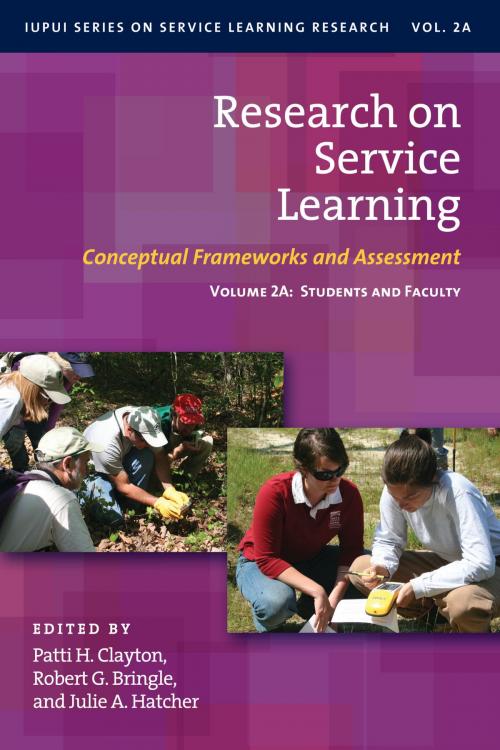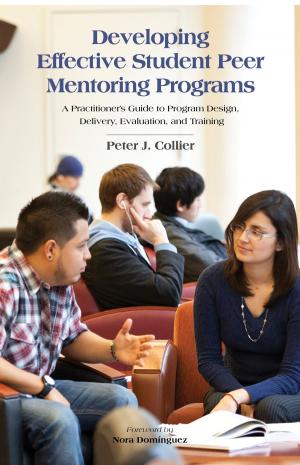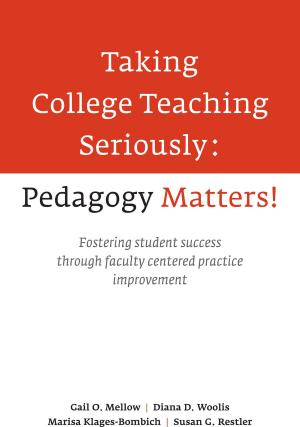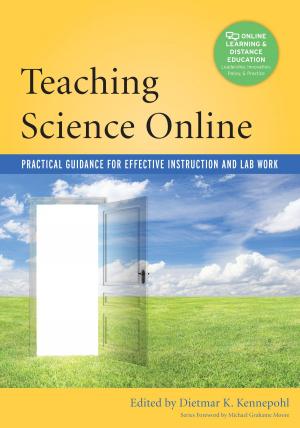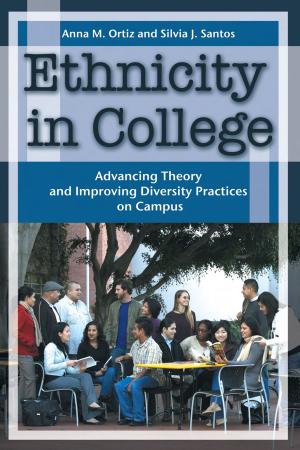Research on Service Learning
Conceptual Frameworks and Assessments
Nonfiction, Reference & Language, Education & Teaching, Higher Education| Author: | ISBN: | 9781579228392 | |
| Publisher: | Stylus Publishing | Publication: | April 30, 2013 |
| Imprint: | Stylus Publishing | Language: | English |
| Author: | |
| ISBN: | 9781579228392 |
| Publisher: | Stylus Publishing |
| Publication: | April 30, 2013 |
| Imprint: | Stylus Publishing |
| Language: | English |
IUPUI Series on Service Learning Research
The purpose of this work is to improve service learning research and practice through strengthening its theoretical base. Contributing authors include both well-known and emerging service learning and community engagement scholars, as well as scholars from other fields. The authors bring theoretical perspectives from a wide variety of disciplines to bear as they critically review past research, describe assessment methods and instruments, develop future research agendas, and consider implications of theory-based research for enhanced practice.
Both volumes open with common chapters focused on defining the criteria for quality research.
Volume 2A then moves on to research related to students, comprising chapters that focus on cognitive processes, academic learning, civic learning, personal development, and intercultural competence. The concluding faculty section presents chapters on faculty development, faculty motivation, and faculty learning.
Volume 2B addresses community development, and the role of nonprofit organizations in service learning. It focuses on institutions , examining the institutionalization of service learning, engaged departments, and institutional leadership. The final section on partnershipsin service learning includes chapters on conceptualizing and measuring the quality of partnerships, inter-organizational partnerships, and student partnerships.
Together these two volumes constitute a rich resource that suggests new approaches to conceptualizing, understanding, implementing, assessing, and studying service learning. Each chapter offers recommendations for future research.
The purpose of this work is to improve service learning research and practice through strengthening its theoretical base. Contributing authors include both well-known and emerging service learning and community engagement scholars, as well as scholars from other fields. The authors bring theoretical perspectives from a wide variety of disciplines to bear as they critically review past research, describe assessment methods and instruments, develop future research agendas, and consider implications of theory-based research for enhanced practice.
Both volumes open with common chapters focused on defining the criteria for quality research.
Volume 2A then moves on to research related to students, comprising chapters that focus on cognitive processes, academic learning, civic learning, personal development, and intercultural competence. The concluding faculty section presents chapters on faculty development, faculty motivation, and faculty learning.
Volume 2B addresses community development, and the role of nonprofit organizations in service learning. It focuses on institutions , examining the institutionalization of service learning, engaged departments, and institutional leadership. The final section on partnershipsin service learning includes chapters on conceptualizing and measuring the quality of partnerships, inter-organizational partnerships, and student partnerships.
Together these two volumes constitute a rich resource that suggests new approaches to conceptualizing, understanding, implementing, assessing, and studying service learning. Each chapter offers recommendations for future research.
IUPUI Series on Service Learning Research
The purpose of this work is to improve service learning research and practice through strengthening its theoretical base. Contributing authors include both well-known and emerging service learning and community engagement scholars, as well as scholars from other fields. The authors bring theoretical perspectives from a wide variety of disciplines to bear as they critically review past research, describe assessment methods and instruments, develop future research agendas, and consider implications of theory-based research for enhanced practice.
Both volumes open with common chapters focused on defining the criteria for quality research.
Volume 2A then moves on to research related to students, comprising chapters that focus on cognitive processes, academic learning, civic learning, personal development, and intercultural competence. The concluding faculty section presents chapters on faculty development, faculty motivation, and faculty learning.
Volume 2B addresses community development, and the role of nonprofit organizations in service learning. It focuses on institutions , examining the institutionalization of service learning, engaged departments, and institutional leadership. The final section on partnershipsin service learning includes chapters on conceptualizing and measuring the quality of partnerships, inter-organizational partnerships, and student partnerships.
Together these two volumes constitute a rich resource that suggests new approaches to conceptualizing, understanding, implementing, assessing, and studying service learning. Each chapter offers recommendations for future research.
The purpose of this work is to improve service learning research and practice through strengthening its theoretical base. Contributing authors include both well-known and emerging service learning and community engagement scholars, as well as scholars from other fields. The authors bring theoretical perspectives from a wide variety of disciplines to bear as they critically review past research, describe assessment methods and instruments, develop future research agendas, and consider implications of theory-based research for enhanced practice.
Both volumes open with common chapters focused on defining the criteria for quality research.
Volume 2A then moves on to research related to students, comprising chapters that focus on cognitive processes, academic learning, civic learning, personal development, and intercultural competence. The concluding faculty section presents chapters on faculty development, faculty motivation, and faculty learning.
Volume 2B addresses community development, and the role of nonprofit organizations in service learning. It focuses on institutions , examining the institutionalization of service learning, engaged departments, and institutional leadership. The final section on partnershipsin service learning includes chapters on conceptualizing and measuring the quality of partnerships, inter-organizational partnerships, and student partnerships.
Together these two volumes constitute a rich resource that suggests new approaches to conceptualizing, understanding, implementing, assessing, and studying service learning. Each chapter offers recommendations for future research.
